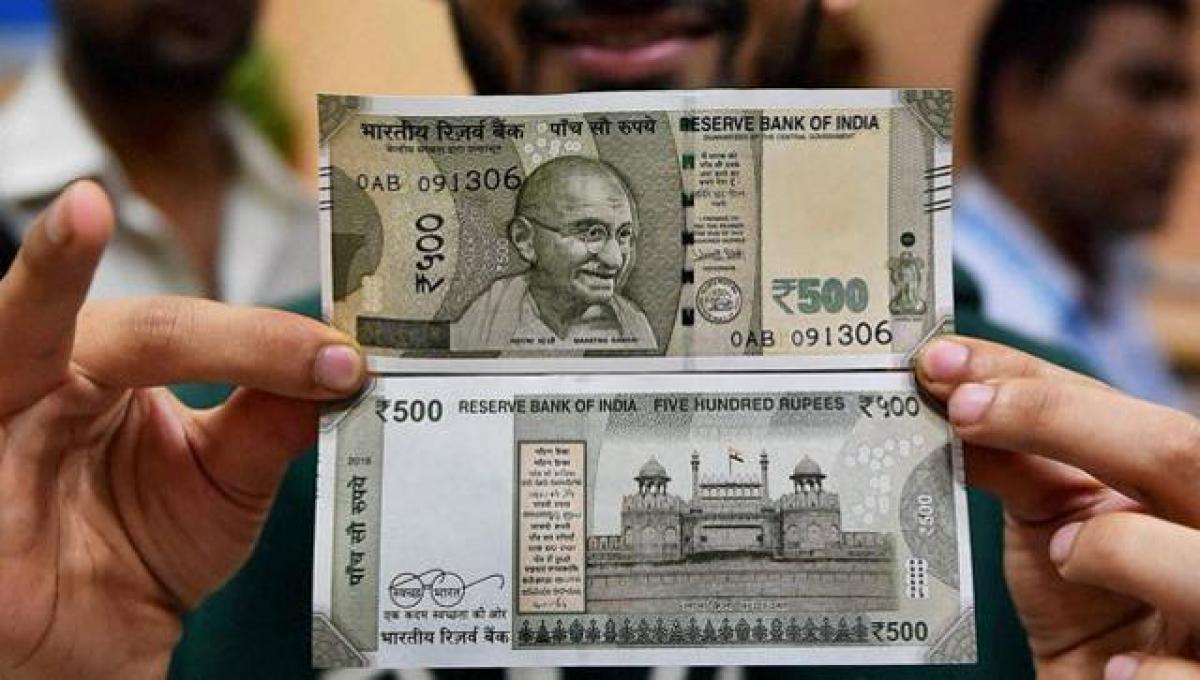Live
- Chanchalguda Jail Officials Say They Haven't Received Bail Papers Yet, Allu Arjun May Stay in Jail Tonight
- BJP leaders present evidence of illegal voters in Delhi, urge EC for swift action
- Exams will not be cancelled: BPSC chairman
- Nagesh Trophy: Karnataka, T.N win in Group A; Bihar, Rajasthan triumph in Group B
- YS Jagan condemns the arrest of Allu Arjun
- Economic and digital corridors to maritime connectivity, India and Italy building vision for future, says Italian Ambassador
- SMAT 2024: Patidar's heroics guide Madhya Pradesh to final after 13 years
- CCPA issues notices to 17 entities for violating direct selling rules
- Mamata expresses satisfaction over speedy conviction in minor girl rape-murder case
- Transparent Survey Process for Indiramma Housing Scheme Directed by District Collector
Just In

The government increased the limit on cash withdrawals from bank accounts on Sunday to calm public anger as millions of people clamored for new rupee bills after a shock abolishment of large denomination notes. The decision was announced within hours of the government launching new Rs 500 notes in circulation.
New Delhi: The government increased the limit on cash withdrawals from bank accounts on Sunday to calm public anger as millions of people clamored for new rupee bills after a shock abolishment of large denomination notes. The decision was announced within hours of the government launching new Rs 500 notes in circulation.
The government relaxed cash withdrawal limits including removing a per-day cap of 10,000 rupees, increasing the weekly limit to 24,000 rupees from 20,000 and allowed exchange of bills over the counter at banks to reach 4,500 rupees instead of 4,000.
Large crowds were again gathered at banks across the country trying to change 500 and 1,000 rupee bills, demonetized by the government on Tuesday, in an effort to crack down on corruption.
Indian banks received 3 trillion rupees ($44.4 billion) of 500- and 1,000-rupee notes over the last four days, the Finance Ministry said in a statement, in a surge in liquidity in the banking system. Short term interest rates are expected to fall as a result.
The move to demonetize the large bills is designed to bring billions of dollars' worth of cash in unaccounted wealth into the mainstream economy, as well as dent the finances of militants who target the country and are suspected of using fake 500 rupee notes to fund operations.
The banned rupee notes made up more than 80 percent of the currency in circulation, leaving millions without cash and threatening to bring much of the cash-driven economy to a halt.
The Reserve Bank of India said small denomination currency notes were available with both the central bank and with other lenders.
People "need not be anxious" and should not hoard bank notes because "cash is available when they need it", the RBI said in a statement. It also asked banks to provide details of cash withdrawn and exchanged daily, in contrast to fortnightly, to provide a better idea on circulation.
The measures came as people complained of lack of access to their accounts despite hours of waiting at banks as well as over the non-functioning of tens of thousands of ATMs not yet reconfigured for the new series of smaller-sized 2000 rupee bills.
A report said that the central bank's office in the western city of Ahmedabad was handing out coins in return for the old notes because it didn't have enough valid tender.
It showed a picture of a man emerging with plastic packets of coins of 10 rupees, underlining the banking system's struggle to make the transition to the new series of notes.
Narendra Modi, facing criticism from opposition groups for putting ordinary people into difficulties, promised further steps to rid the country of graft.
"I know the forces up against me, they may not let me live, they may ruin me because their loot of 70 years is in trouble, but I am prepared," he said in a speech in western seaside resort of Goa. The decision to demonetize the high value notes was planned in secrecy over the past 10 months, he said.
Modi came to power in 2014 with a mandate to boost economic growth and fight the corruption that taints large parts of political and business life.
So far, despite the rising difficulties people are facing, his crackdown on corruption is supported particularly among the middle-class which want action against the political and business elite for wrongdoing.
Anil Dalavi, a 32-year-old Mumbai resident with 20 rupees in his pocket who was waiting outside a bank, said he supported Modi's efforts to go after people with ill-gotten wealth.
"It has been tough for middle class people like us because we were caught completely unaware. But since this is a good move to flush out black money, I am willing to bear the pain."
Political Backlash
Modi's political opponents said they would unite to fight the demonetization move which had made lives difficult for millions of ordinary people.
"The government has spread anarchy in the country, the common man cannot buy daily products," said Mulayam Singh Yadav, leader of Samajwadi party, as crowds formed outside banks in Lucknow, the capital of the country's most populous state Uttar Pradesh. Yadav demanded Modi withdraw the decision to cancel the bank notes.
Uttar Pradesh, which holds state elections early next year, sends the largest number of legislators to India's national parliament.

© 2024 Hyderabad Media House Limited/The Hans India. All rights reserved. Powered by hocalwire.com







